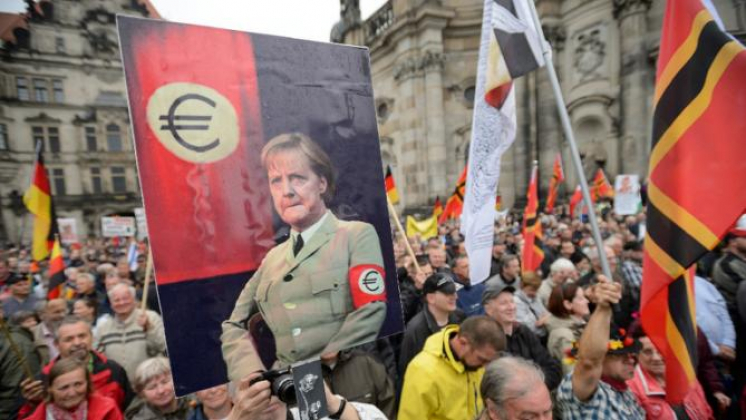Center-right against Migrants
The German Chancellor Angela Merkel sharply criticized the decision of neighboring Austria to reduce the number of immigrants staying in the country. She stated this at a meeting with the leadership of her largest ally in the ruling coalition of the Bavarian “Christian Social Union” (the CSU). The CSU always wants to limit the number of migrants. The head of the party, Horst Seehofer, after meeting with Merkel, said that he was disappointed and does not believe that Merkel will be able to resolve the issue at the European level.
Earlier Seehofer, the leader of Germany's largest regional party and the head of the Bavarian government, demanded the Chancellor to limit the number of migrants, change the policy on the reception of refugees and restore a number of legal norms on the border. He threatened that the consequence would be Merkel appearing before the court.
Together with Globalists against the People
Despite Merkel’s declining level of trust, according to the latest public opinion survey on her policies, only 37% of Germans support her; the Chancellor continues a suicidal policy. Maybe the secret is that these actions are supporting the globalist elite. The Rothschild International Monetary Fund published a report, stating that the migration influx allegedly contributes to the growth of Europe’s economy.
The Trend for 2016: Critics of the International Policy of the Center-Right
The EU and Germany’s migration policy in 2015 led to disastrous consequences. The declared principles of tolerance and multiculturalism proved to be completely useless (events in Cologne). In January, after the events in Cologne, protests in Germany against the EU and Merkel’s immigration policy became more frequent in nature.
If, in 2015, the anti-immigration position in Germany was openly represented by the party of ultra right-wing (PEGIDA, the NPD), now the anti-migration political course is joined by the center-right party (as is evidenced by the statements of the Bavarian CSU deputies and the protest of the Alternative for Germany party). On January 20th, approximately a thousand demonstrators went to the protest arranged by the ‘Alternative for Germany’ party in Jena. The main demand of the protesters was a change in the course of the migration policy in Germany (to protect the German borders from illegal immigrants). The demonstrators also expressed the need to cooperate with Russia to fight against terrorism. According to the head of the party, Alexander Gauland, “The West cannot win the war on terror without Russia, and has no chance of eliminating the causes of the migration crisis.”)
Time to Pay
By receiving more than one million refugees, Germany has put its economic well being at risk. According to the Institute of World Economy estimations, in 2015, migrants received more than 10 billion euros. According to forecasts, in 2016 the refugees in Germany will get from 25 to 55 billion euros (depending on the number of refugees arriving in Germany in 2016). If we consider 2016 to 2022, the German migrants will be given approximately 385 billion euros.
The payments to migrants are based on the 1951 Geneva Refugee Convention. However, each country has the right to independently set the amount of social assistance. In Germany, the social payment is 400 euros (in comparison to 140 euros in Eastern Europe). In addition, refugees have a right to free access to public transport, full medical insurance, paid utilities and accommodation. The amount of spending is about 800 euros per refugee.
Such expenditure on migrants further threatens the German economic crisis, and, at the same time, gains the dissatisfaction of the native German population. The anti-immigration demonstrations are to take place every week, accumulating a growing number of participants, where there are not only representatives from the ultra-right-wing nationalist groups (the NPD and PEGIDA), but also the parliamentary center-right conservative parties.


